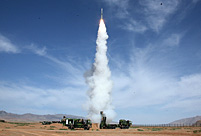Chinese couples are the most sexually active in the Asia-Pacific region, but a large number remain dissatisfied with their sex life, according to a survey endorsed by the International Society of Sexual Medicine.
Chinese respondents said they had sex nine times per month on average, compared with an average of 7.7 times across the Asia-Pacific region.
However, many identify premature ejaculation and the brevity of intimate sessions among key reasons for dissatisfaction.
The 2013 Asia-Pacific Sexual Behaviors and Satisfaction Survey polled more than 3,500 respondents in nine locations across the region, including Australia, China, South Korea and Singapore.
The respondents were males and females aged 18 to 45, and included 1,002 people from the Chinese mainland.
"The survey aims to spot possible factors impairing sexual satisfaction and help improve the sexual health of the people," said Chris McMachon, president of the society.
In China, some 52 percent of those polled said they were not satisfied with their sex life, a figure that reflects the general situation across the entire region.
Meanwhile, about 96 percent of the Chinese female respondents said they wanted prolonged sexual intercourse, far higher than the average of 63 percent among women in the region.
Thirty percent of Chinese men surveyed said they were concerned about their partners' level of satisfaction with their sexual relationship. The figure for the Asia-Pacific region as a whole was 38 percent.
While erectile dysfunction was not included in the survey results, 84 percent of concerns raised by respondents related in some way to the issue of PE.
According to McMachon, PE involves aspects of length of time, control of ejaculation, and related negative feelings like distress. He said that international studies show that the length of time couples spend making love in each session averages to 5.4 minutes.
Thirty-two percent of men polled alleged they suffered from PE.
Risk factors for PE include genetic predisposition and poor nerve conduction, while mental factors contributed to nearly 20 percent of all PE cases, said McMachon.
Regarding socioeconomic factors affecting PE, he said that less educated men were more often affected by the complaint.
Jiang Hui, president-elect of the Chinese Society of Andriatrics under the Chinese Medical Association, added that prostate diseases were also a factor. "But that in most cases, PE doesn't affect pregnancy," he said.
The survey showed that only 30 percent of PE sufferers in China sought medical treatment, compared with 55 percent throughout the region.
The report revealed various misunderstandings on the issue, with some 20 percent of respondents saying that the same treatment would apply for both ED and premature ejaculation.
According to Jiang, the Chinese seldom consider PE to be a medical condition, a fact that contributed to the low rates of treatment.
In the andriatrics department where Jiang works, about half of the total cases involve infertility, while some 30 percent involve ED.
He says that as public awareness of PE improves, many more men suffering from the condition will seek treatment.
However, he pointed out that so far China has no uniform clinical standards for the diagnosis of PE.
A combination of drug treatment and physiological counseling works well to improve the situation, according to McMachon.
He also urged females to encourage their partners to overcome the condition.
"Usually we say that it is the couple, not just the man, who suffers from or fights PE," he said.
 Storms leave 97 dead, 58 missing in Mexico
Storms leave 97 dead, 58 missing in Mexico New model of indigenous surface-to-air missiles testfired
New model of indigenous surface-to-air missiles testfired  118.28-carat diamond to be auctioned in HK
118.28-carat diamond to be auctioned in HK Maternal love under streetlight
Maternal love under streetlight Naked foreign student sits in the middle of a road in Haikou
Naked foreign student sits in the middle of a road in Haikou  Colorful Yunnan: Enjoy the natural beauty
Colorful Yunnan: Enjoy the natural beauty Harbin named Chinese city with most beautiful women
Harbin named Chinese city with most beautiful women New college students' military training in Guangzhou
New college students' military training in Guangzhou Rugby girls
Rugby girls PLA's 38th Group Army conduct training
PLA's 38th Group Army conduct training Residences of the royal house of Savoy
Residences of the royal house of Savoy The last days of Wan Aihua
The last days of Wan Aihua Highlights at 12th National Games of China
Highlights at 12th National Games of China Beijing Film Academy welcomes freshmen
Beijing Film Academy welcomes freshmen Large mahjong party sets new world record
Large mahjong party sets new world recordDay|Week|Month